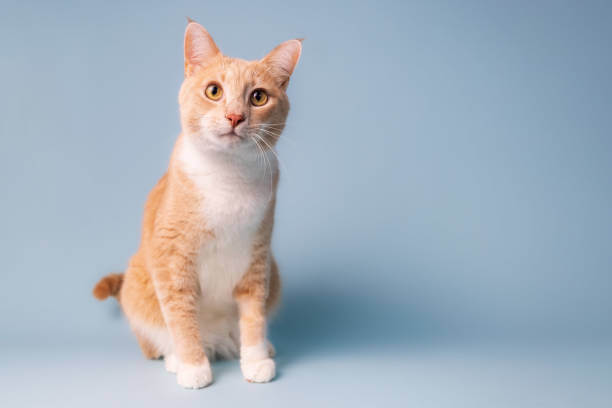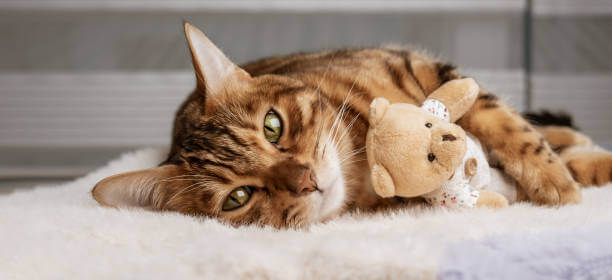Cats, with their mysterious and often unpredictable behavior, have captivated humans for centuries. Can Cats Have ADHD? From their graceful leaps to their stealthy hunting skills, they possess a charm that is hard to resist. But have you ever wondered if cats can have Attention Deficit Hyperactivity Disorder (ADHD) just like humans? In this article, we will explore the fascinating world of feline behavior and shed light on whether cats can exhibit symptoms similar to ADHD. We’ll also discuss the various factors that contribute to a cat’s behavior and provide insights from our trusted veterinarian.

Understanding Feline Behavior
Before delving into the question of whether cats can have ADHD, it’s crucial to understand their natural behavior patterns. They are instinctive hunters and spend a significant portion of their waking hours engaged in activities such as stalking, pouncing, and climbing. This behavior is deeply rooted in their evolutionary history as solitary predators.
Normal Cat Behavior
- Grooming: Cats are meticulous groomers who spend a considerable amount of time cleaning themselves. Grooming not only helps them maintain hygiene but also serves as a self-soothing mechanism.
- Playful Nature: Kittens and young cats are especially known for their playful nature. Play serves multiple purposes for cats, including exercise, honing hunting skills, and mental stimulation.
- Territory Marking: Cats mark their territory by rubbing against objects or spraying urine strategically. This behavior helps them establish boundaries within their environment.
- Sleeping Patterns: It’s not uncommon for adult cats to sleep for 12-16 hours a day! They alternate between short periods of intense activity and longer periods of restorative sleep.
Understanding these normal behaviors provides a foundation for recognizing any deviations or potential signs of feline ADHD.
Can Cats Have ADHD?
ADHD is often associated with humans, but can it occur in our feline companions? While cats cannot be diagnosed with ADHD in the same way humans can, they can exhibit behaviors that are similar to those seen in individuals with ADHD. However, it’s important to note that these behaviors may not necessarily indicate a disorder but rather variations in individual personalities or responses to environmental stimuli.
Hyperactivity
Some cats may display hyperactive behavior characterized by excessive energy levels and constant movement. They may engage in racing around the house, excessive scratching, or destructive behavior. It’s crucial to consider other factors such as age, breed, and overall health before attributing hyperactivity solely to feline ADHD-like symptoms.
Impulsivity
Impulsivity is another characteristic associated with ADHD that can sometimes be observed in cats. This behavior manifests as acting without thinking, such as jumping from high places without considering the consequences or engaging in rough play without restraint. However, impulsivity can also be influenced by factors like boredom or inadequate mental stimulation.
Inattention and Focus Issues
Cats are known for their independent nature and selective attention. While some cats have laser-like focus when stalking prey or exploring new territory, others may appear easily distracted or disinterested. It’s important to consider whether these behaviors are consistent across various situations or if they occur only under specific circumstances.
Factors Influencing Feline Behavior
Understanding the factors that influence a cat’s behavior is vital when attempting to determine whether their actions resemble those of an individual with ADHD. Several key elements contribute to a cat’s behavior:
Genetics
Genetics plays an essential role in determining a cat’s temperament and behavior patterns. Breeds like Abyssinians and Bengals are known for their high energy levels and curiosity. These genetic predispositions may make certain cats more prone to exhibiting hyperactive tendencies.
Environmental Enrichment
The environment in which a cat lives significantly impacts its behavior. Cats require mental and physical stimulation to prevent boredom and frustration. Providing interactive toys, scratching posts, and vertical spaces for climbing can help channel their energy in positive ways.

Health and Well-being
Underlying health conditions can also influence a cat’s behavior. Pain, discomfort, or an unbalanced diet may lead to restlessness or other abnormal behaviors. If you suspect your cat’s behavior is unusual or disruptive, it’s essential to consult with a veterinarian to rule out any medical issues.
Routine and Stability
Cats thrive on routine and stability. Sudden changes in their environment or disruptions in their daily patterns can cause stress or anxiety, leading to behavioral changes. Establishing a consistent feeding schedule, playtime routine, and providing safe spaces for rest can contribute to a calmer demeanor.
Exploring Alternative Explanations
While some cats may exhibit behaviors reminiscent of ADHD, it is essential to consider alternative explanations before concluding that feline ADHD is the cause. Other factors that may contribute to hyperactivity or inattention include:
Underestimation
Cats require regular mental and physical stimulation to remain content and balanced. Without adequate opportunities for play and exploration, they may become restless or display attention-seeking behaviors.
Stress or Anxiety
Stressful situations such as changes in the household dynamic, the introduction of new pets, or unfamiliar visitors can trigger behavioral changes in cats. It’s crucial to identify potential stressors and provide a safe and secure environment for your feline friend.
Lack of Socialization
Early socialization plays a vital role in shaping a cat’s behavior. Insufficient exposure to various people, animals, or environments during their formative weeks can lead to anxiety-related behaviors later in life.
Final Thoughts
When observing behaviors that may resemble ADHD in cats, it’s essential to consider all possible explanations and seek professional advice when needed. Taking the time to understand each cat’s individual needs and providing them with a safe and stimulating environment can help ensure their overall well-being. With proper care, cats can lead long, happy lives!
Overall, our feline friends are complex creatures and their behavior is heavily impacted by both nature and nurture. It’s important that cat owners take the time to observe their cats closely to identify any discrepancies in their behavior or changes in their environment that could be causing stress. Providing mental and physical stimulation, as well as a safe and secure environment, can help ensure that your furry friend leads a happy and healthy life
An important part of feline care is regular vet visits. If you suspect that your cat’s behavior may be indicative of an underlying issue, it’s best to consult with a veterinarian for professional advice. They can help diagnose and treat any conditions that may be causing disruptions in your cat’s behavior.
FAQS
Q: What should I do if my cat exhibits ADHD-like behavior?
A: If your cat is displaying symptoms that are consistent with ADHD, it’s best to consult with a veterinarian for professional advice. They can help determine the source of the behavior and provide appropriate treatment if needed. Additionally, providing adequate mental and physical stimulation, as well as a safe and secure environment, can help ensure that your cat leads a balanced and happy life.
Q: Are there any home remedies for cats with ADHD-like behavior?
A: While there are no home remedies for diagnosing or treating feline ADHD, providing mental stimulation through interactive toys, scratching posts, or vertical spaces can help channel their energy in positive ways. Additionally, making sure they have access to a safe and secure environment can help reduce stress and anxiety-related behaviors. If you suspect that your cat’s behavior is linked to an underlying medical issue, it’s best to consult with a veterinarian for professional advice.
Q: How can I tell the difference between normal and abnormal behavior in my cat?
A: Normal feline behavior includes exploring their environment, playing with toys, sleeping, and grooming. If your cat is displaying unusual or disruptive behaviors that are consistent across various situations, it’s best to consult with a veterinarian for professional advice.
Q: What other factors can contribute to abnormal feline behavior?
A: Other factors that can contribute to unusual or disruptive behaviors in cats include genetics, environmental enrichment, health and well-being, and routine and stability. It’s important to consider all possible explanations before reaching any conclusions about your cat’s behavior.
Conclusion
It’s important to remember that cats are complex creatures and their behavior is heavily impacted by both nature and nurture. Taking the time to observe your cat closely, provide mental and physical stimulation, establish a daily routine, and seek help from a veterinarian when needed can help ensure that your furry friend leads a balanced and happy life.
If you suspect your cat’s behavior may be linked to an underlying condition, it’s best to consult with a veterinarian for professional advice. They can help diagnose and treat any conditions that could be causing disruptions in your cat’s behavior. With proper care and attention, cats can lead long, happy lives!
